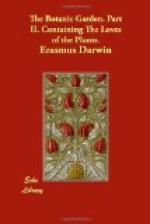The increase of the irritability of plants in respect to heat, after having been previously exposed to cold, is further illustrated by an experiment of Dr. Walker’s. He cut apertures into a birch-tree at different heights; and on the 26th of March some of these apertures bled, or oozed with the sap-juice, when the thermometer was at 39; which same apertures did not bleed on the 13th of March, when the thermometer was at 44. The reason of this I apprehend was, because on the night of the 25th the thermometer was as low as 34; whereas on the night of the 12th it was at 41; though the ingenious author ascribes it to another cause. Trans. of Royal Soc. of Edinburgh, v. 1. p. 19.]
“Breathe,
gentle AIR! from cherub-lips impart
Thy
balmy influence to my anguish’d heart;
325 Thou, whose soft voice calls forth the tender
blooms,
Whose
pencil paints them, and whose breath perfumes;
O
chase the Fiend of Frost, with leaden mace
Who
seals in death-like sleep my hapless race;
Melt
his hard heart, release his iron hand,
330 And give my ivory petals to expand.
So
may each bud, that decks the brow of spring,
Shed
all its incense on thy wafting wing!”—
To
her fond prayer propitious Zephyr yields,
Sweeps
on his sliding shell through azure fields,
335 O’er her fair mansion waves his whispering
wand,
And
gives her ivory petals to expand;
Gives
with new life her filial train to rise,
And
hail with kindling smiles the genial skies.
So
shines the Nymph in beauty’s blushing pride,
340 When Zephyr wafts her deep calash aside;
Tears
with rude kiss her bosom’s gauzy veil,
And
flings the fluttering kerchief to the gale.
So
bright, the folding canopy undrawn,
Glides
the gilt Landau o’er the velvet lawn,




